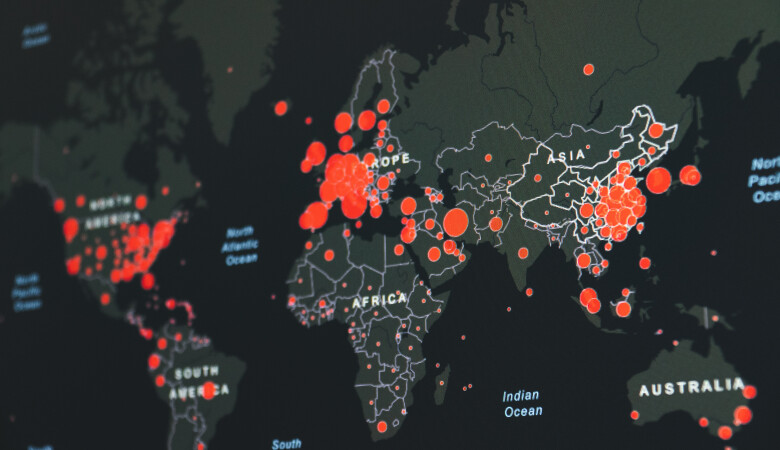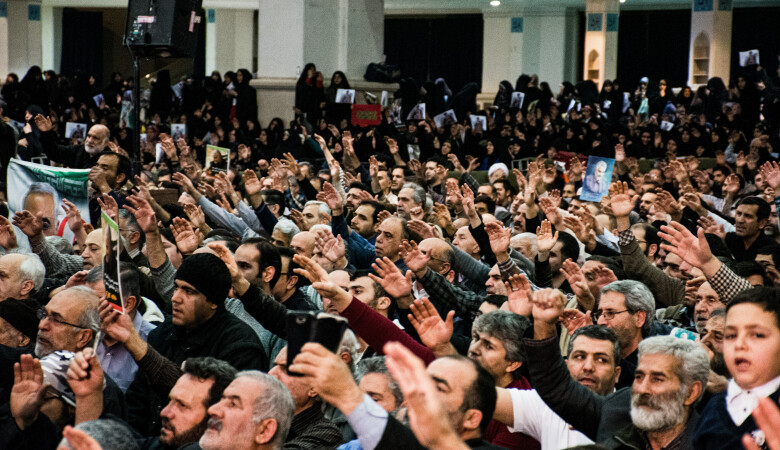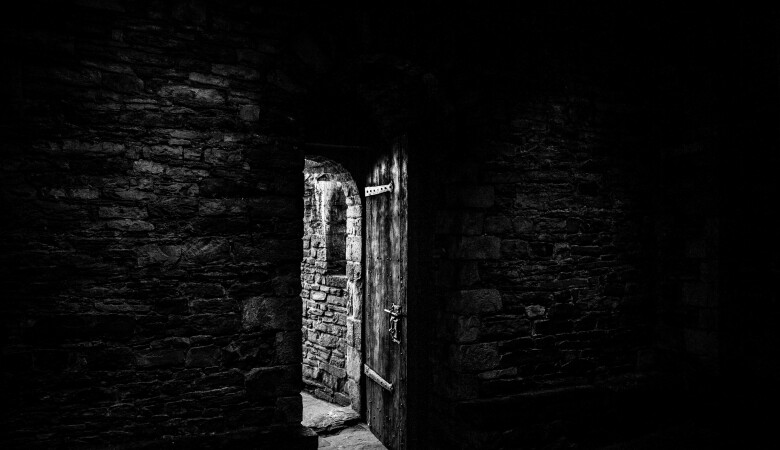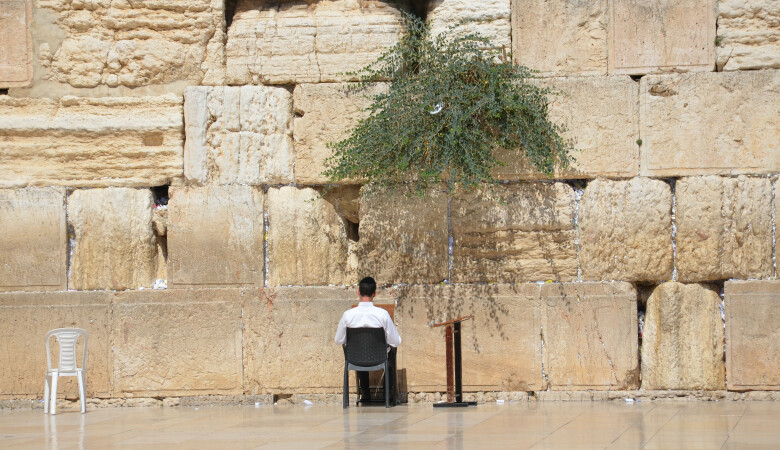Series: Mark
The Necessity and Certainty of Worldwide Evangelization (Mark Sermon 71)
December 10, 2023 | Andy Davis
Mark 13:10
Missions, Return of Christ, Majesty of God
The Gospel must be preached to all nations because God has elected some from every tribe, language, people, and nation to be in heaven.
- SERMON TRANSCRIPT -
Turn in your Bibles if you would, to Mark, chapter 13, and you can also turn as well to Matthew 24. We're going to be looking at both of those places. The Scripture reveals that despite all of its swirling complexity, human history has a purpose. We are moving to a destination. We're going somewhere with all of this. It's not just random chaos, but God has a plan and a purpose. The destination the Bible reveals, to which we're going, is a perfect universe, a perfect world free from all sin and a beautiful radiant city. The New Heavens and the New Earth are that perfect universe and that radiant city is called the New Jerusalem. The Bible reveals that the light source of that new universe and of the New Jerusalem, according to Revelation 21 and 22, is the glory of God, the glory of God. Revelation 21:23 says, "The city”[the New Jerusalem] "does not need the sun or the moon to shine on it for the glory of God gives it light and the lamb is its lamp." Again, in the next chapter, Revelation 22:5 it says, "They will not need the light of a lamp or the light of the sun, for the Lord God will give them light." But what is that? What is the glory of God?
In my studies and my meditations, I've thought a lot, it's an important topic. I believe the glory of God is the radiant display of the attributes or the perfections of God. Sometimes it's just brilliant light, as 1 Timothy 6:16 says, "God dwells in unapproachable light." Well, think about that, unapproachable light. How amazing must that be? For this reason, the Seraphim in Isaiah's vision were constantly covering their faces, though they had no sin or guilt, but just in that unapproachable light, the presence of the glory, they were covering their faces.
For this reason also, the theophanies, or the displays of God, where God shows up in human history are frequently attended by overpowering light, like in Ezekiel's vision of the likeness of the glory of God by the Kibar River east of Babylon. Ezekiel 1 says, "High above on the throne was a figure like that of a man. And I saw from what appeared to be his waist up, He looked like glowing metal as if full of fire. And that from there down He looked like fire and brilliant light surrounded Him, like the appearance of a rainbow in the clouds on a rainy day, so was the radiance around him. This was the appearance of the likeness of the glory of the Lord. And when I saw it, I fell face down."
So radiant, light, brightness connected with the glory of God. Also at the time of the birth of our Lord in Bethlehem, an angel appeared to shepherds outside Bethlehem and it says in Luke 2:9-10, "There were shepherds living out in the fields nearby, keeping watch over the flocks at night. An angel of the Lord appeared to them and the glory of the Lord shone around them, and they were terrified." This was a glory of the eye, not of the mind or heart. It was just bright light, and it stunned the shepherds that night.
But the glory of God is seen not just in brilliant light, sometimes it's in the radiant display of the perfections of God, the attributes of God woven into the tapestry of historical events. That takes the eye of faith to see it, but it's there. The attributes of God woven into the tapestry of history. The perfections of God, attributes of God, include His wisdom, His power, His love, compassion, justice, patience, kindness, mercy. These are attributes.
God has ordained history, the story of history, for this reason to put Himself on display in the sequence of events and unfolding history. He put Himself on display in a history, a story, that He predestined before Christ began, written in His own mind before time began. The sequence of events, this history, has all been written out by the author of history and it's intrinsically connected with the Christ event, the story of the Gospel of Jesus Christ. Jesus himself said in Revelation 22:13, "I am the alpha and the omega. I am the first and the last, the beginning and the end." History is linear, and Jesus is history. Jesus is what the story is all about.
The radiant display of the glory of God in heaven, I believe, will consist in part in a retelling of His mighty works in saving His people from their sins and in their individual context all over the world, across the centuries, a retelling of the mighty works of God and saving sinners. I believe it's the most glorious thing God has ever done. His glory is greatly on display in salvation. Revelation 7:9-10 says, "After this, I looked, and there before me was a great multitude that no one could count from every nation, tribe, people, and language, standing before the throne and before the Lamb. They were wearing white robes, and they were holding palm branches in their hands, and they cried out in a loud voice, 'Salvation belongs to our God who sits on the throne and to the Lamb.'"
"The radiant display of the glory of God in heaven, I believe, will consist in part in a retelling of His mighty works in saving His people from their sins and in their individual context all over the world, across the centuries."
Here's a multitude, a huge quantity of people, from all over the world, every imaginable context, standing around the throne of God in heaven praising God for salvation. The specific stories of these individual people that make up these millions from every nation on Earth, will bring infinite and eternal glory to God. A few verses later, Revelation 8:13, "Then one of the elders asked me, 'These in the white robes, who are they and where did they come from?'" As I've said many times before, that story will take forever to tell fully. It is so complex, but it is woven through with light, it’s woven through with glory. "These redeemed," who are they and where do they come from? Well, how long do you have? We have all eternity. So, pull up a chair and let's hear the story of how God redeemed this one and that one and the other one from all over the world. Heaven will be filled with the stories of the greatness of God put on display in the amazing tapestry of history that He wove in every century.
This is the story of missions. The spread of the Gospel of Jesus Christ from Jerusalem to the ends of the Earth across every generation of history, that unspeakable glory as before us this morning. We're going to focus just on two verses of scripture. Mark 13:10, right in the middle of our Mark study, and then a parallel verse, Matthew 24:14. Mark 13:10, "And the gospel must first be preached to all nations." Matthew 24:14, "And this gospel of the kingdom will be preached in the whole world as a testimony to all nations and then the end will come."
I want to tell you something about the science of Bible interpretation. The Gospels, there are four of them, three of them basically take the same approach to the life of Jesus. Matthew, Mark ,and Luke. They're called synoptic because they see things from about the same perspective. Then the fourth Gospel, John, comes at it from a different perspective, but they all tell the same thing. We believe that all scriptures God-breathed is perfect, so therefore these are four perfect accounts of the life of Christ, but they have some differences with one another. When we have those differences between, let's say, Matthew and Mark, we harmonize. We don't pit them against each other, we put them together. We try to harmonize, and that's not always easy to do. Generally, I look on it as a two-for-one sale. I'm going to take both statements here as true, and if one of them tells me one thing, He said that and that's true, and if one of them tells something else, He said that, and I just harmonize, I put it together.
I. Context: Jesus’ Prediction of the Destruction of the Temple
Let's talk about the context here. We're moving through the Gospel of Mark. Mark 13 is Jesus's description of the history of the end of the world and the events leading up to the destruction of Jerusalem and the Temple and the end of the world. It came from a statement Jesus made in Mark 13:2: "Not one stone will be left on another. Everyone will be thrown down." This was a prediction of the destruction, at least of the Temple, but probably really of the whole city of Jerusalem and focused on the temple. It was the final week of Jesus's life. Things were hurdling to a conclusion, the dramatic turbulent events culminating in His arrest and His trial before the Jewish leaders. His condemnation by them is being handed over to Pontius Pilate for condemnation by the Romans and then His crucifixion by Pontius Pilate and the Romans. So that's where we're heading.
Jesus has given a seven-fold denunciation of the Scribes and Pharisees, the spiritual leaders of the Jewish nation. It's fully depicted in Matthew 23. It's just quickly summarized in Mark. But it culminates in this statement in Matthew 23: 38-39, "Jesus says, 'Behold your house is left to you desolate.'" This is a very important statement—your house is left to you desolate. “Desolate” means “empty." The reason I'm saying that is, "For, I tell you, you will not see Me again until you say ‘Blessed is He comes in the name of the Lord.’" “Not seeing Me again” is the essence of your desolate house. That's what makes your house desolate. Then Jesus dramatically walked out of the Temple, never to return again.
The disciples came up at that moment and chose that moment to talk about how beautiful the Temple was. We shouldn't be surprised at this. This is what the disciples, the apostles were like, frequently off message. This is who we are as well. “As Jesus was leaving the temple, one of his disciples said to him, ‘Look, teacher, what massive stones, what magnificent buildings.’ ‘Do you see all these great buildings?’ replied Jesus. ‘Not one stone here will be left on another, every one will be thrown down.’" That must've been incredibly distressing to them. They come to Him later, privately, when He's out of the city, He's up on the Mount of Olives, across the Kidron Valley, they're out of the city and they're there. As Jesus was sitting on the Mount of Olives, Matthew 24:3, “The disciples came to Him privately. 'Tell us,' they said, 'When will this happen and what will be the sign of Your coming and of the end of the age?’"
Matthew 24 and Mark 13 cover roughly the same ground, but Matthew 24, in much more detail. There's almost nothing found in Mark 13 that's not found in Matthew 24, and there are other things besides in Matthew 24, so I have my eye on both. Matthew 24 has the full question the disciples asked and the fuller answer that Jesus gives. The three parts of the question in Matthew 24 are, "Tell us, when will this happen?" And, "What will be the sign of Your coming and of the end of the age?" The complexity of Matthew 24 and of Mark 13 comes in discerning and kind of to some degree, unweaving the tapestry of Jesus's answer. What is He talking about right now in this part? Is He talking about the destruction of Jerusalem in 870 AD by the Romans? Is He talking about the end of the world? What is it? They weave it through.
Jesus, I believe, is giving a history of the world between His First and Second Comings. It's bigger than just the destruction of the Temple. Just to tell you, if you look at Mark 13:10, a key word for me in that is the word “first.” First. "This gospel must first be proclaimed to all nations." First before what? Before the destruction of the temple? That didn't happen. So clearly, Jesus's scope is bigger than the destruction of the Temple. He's looking at, I believe, all history, from the First to the Second Comings of Christ, and He's traveling and traversing that history.
Look at verses 5-13, Mark 13. Jesus has said to them, “Watch out that no one deceives you. Many will come in my name claiming I am He and will deceive many. When you hear of wars and rumors of wars, do not be alarmed. Such things must happen, but the end is still to come. Nation will rise against nation and kingdom against kingdom. There'll be earthquakes in various places and famines. These are the beginning of birth pains. You must be on your guard. You'll be handed over to local councils and flogged in the synagogues. On account of Me, you'll stand before governors and kings as witnesses to them."
Here's our focus verse, verse 10, "And the gospel must first be preached to all nations. Whenever you are arrested and brought to trial, do not worry beforehand about what to say. Just say whatever is given to you at the time, for it is not you speaking, but the Holy Spirit. Brother will betray brother to death and a father his child. Children will rebel against their parents, and have them put to death. Everyone will hate you because of Me, but he who stands firm to the end will be saved."
Last week, we traced out those thirteen verses and looked at the whole answer. Just to summarize, it begins with a warning against false teaching. He goes from that to a prediction of the ordinary convulsion of events of history, wars and rumors of wars. That happens in every generation, almost every year of history, nation rising against nation, kingdom against kingdom. That's all the time. There'll be famines, earthquakes, various places. He calls all this the beginning of birth pains. The birth pains means a terrible convulsion or pain resulting in something beautiful and wonderful. We're heading to a good destination, but we have a lot of pain to go through first. That's what “beginning of birth pain” means.
Then He mentions persecution. They will be handed over to the local councils. They'll be flogged in synagogues. These will be opportunities for them to be witnesses to Him. They will testify to Jesus. "On account of me, you'll stand before governors and kings as witnesses to them." The flow of human history is a canvas on which the masterpiece of redemptive history is being painted. These commonplace convulsions, wars, rumors of wars, famines, earthquakes, arrests, trials, all of that is being sovereignly controlled to accomplish the spread of the Gospel, to accomplish the salvation of God's people, to accomplish the glory of God. That's what's going on here.
It's amazing how God controls history even down to the micro-level, to achieve His purposes. I found a number of years ago a great example of this in the life of John Calvin. John Calvin is a great reformer who spent most of his life in Geneva, a great theologian, tremendous leader. However, he was not originally Swiss. Geneva is a city in Switzerland. He was French and he was basically a refugee, a religious refugee running for his life because he believed in the Reformation. The Catholic King of France was persecuting what they called Lutherans, and he was running for his life. By this time, he had already written a significant theological work, and he was on his way to the French city of Strasbourg. He had in mind a quiet life as a scholar. He was going to be quiet in his room and eat little bowls of gruel and write theology books, and that was going to be his life. That would've made him happy. He was that kind of person.
At any rate, he was a scholar but already well known. Amazingly, en route to Strasbourg, he couldn't go there because an obscure war had broken out between the King of France and Charles the Fifth, the Holy Roman Emperor. It's not at all one of the most famous wars ever. It's one of those wars and rumors of wars that Jesus talked about. But as a result, the straight road to Strasbourg was blocked with troop movements. So here, this fleeing man, this refugee has to divert through the city of Geneva. At any rate, there he is in Geneva, and William Farel, who started a Reformation work there hears that Calvin is there, and he thinks this is just the guy that we need for the Reformation here in Geneva. He was right, but Calvin had no such intention. When Farel came and said, "I want you to work here in Geneva," he said, "No, no, I'm going to go have a quiet life writing books in Strasbourg." He didn't say it just like that, but it probably went something like that. After Farel tried to persuade him and wasn't successful, Farel rose up in what Calvin called intemperate zeal and threatened him with the judgment of God if he chose a quiet life of academia rather than taking part in the Reformation in Geneva. Calvin was wired to fear that kind of thing and said, "Okay, I guess I'll stay in Geneva,” and he did. He was there most of the rest of his life.
What's my point? Wars and rumors of wars for a purpose. "Are you saying that God orchestrated a war between Catholic King Francis of France and Catholic King Charles the Fifth, so that John Calvin would end up in Geneva and not Strasbourg?" Yes, that's what I'm saying, and other things too. Other things too, but at least that. That's what God does. Isn't it amazing that history has a purpose? Even as it seems to be churning and random and destructive, God is at work in the midst of all of it.
The central work of all of this is, "You will be witnesses for me. You'll be my witnesses. You are going to proclaim this gospel." Look at verse 10, "And the gospel must first be preached to all nations." The power of the Holy Spirit is central to this mission. He said, "Do not worry ahead of time what to say, what to speak. It will not be you speaking, but the Holy Spirit." The Spirit is the driving orchestrator and force of the spread of the gospel, the third person of the Trinity, that is His role and He's extremely good at his job. As Acts 1:8 says, "You'll receive power when the Holy Spirit comes in you and you'll be My witnesses in Jerusalem and Judea, Samaria to the ends of the Earth."
In the midst of all this, there'll be a tremendous amount of pain for the witnesses, painful betrayals, family relationships will be compromised. Your own closest relatives will turn their backs on you. "Everyone will hate you because of Me," Jesus says. Intense persecution, and that's what makes this journey so glorious. The courage, the boldness, the suffering, the willingness to pay the price. That's the story. That's big picture.
II. A Command in Mark
Let's zero in on the command, Mark 13:10, “And the gospel must first be preached to all nations." In Mark's version, Mark 13:10, it takes a command form, effectively. It's a command in Mark. It uses the Greek word “dei”, which means “it is necessary,” but that's frequently a command, a sense of a command. It is necessary for the Gospel first to be preached to all nations.
What is the Gospel? The Gospel is the message of the kingdom of God with Jesus as the King of the kingdom of God. He's the centerpiece, he is the King, he's the Lord, he's the Savior. The Gospel is the good news about Jesus Christ and all that that means. That's what the Gospel of Mark has been unfolding all along. It's a message about the kingdom of God, that God is King.
"What is the Gospel? The Gospel is the message of the kingdom of God with Jesus as the King of the kingdom of God. He's the centerpiece, he is the King, he's the Lord, he's the Savior. The Gospel is the good news about Jesus Christ and all that means."
The kingdom is the spiritual realm where the subjects of the King are delighted to have God as their King, and they're pleased to obey Him and to follow Him. They're delighted about it. God's sovereignty over rebels is a different matter, but the advancing kingdom of God has to do with individuals who throw down their weapons of rebellion and come in gladly under the kingship of Christ.
The Gospel is, as we've said before, God, man, Christ, response. That God created the universe, the heavens and the Earth, and as the Creator, He has the right to make laws and rules by which we live our lives. God, the Creator, God the King, God, the Lawgiver and God the Judge. That's God.
Man, we are created in the image of God to have a relationship with Him, to have a love relationship with Him and to love each other, but we have sinned. We have broken the two Great Commandments. We have not loved God with all of our hearts, all mind and strength. We have not loved our neighbor as ourselves. We have sinned. Therefore, we stand under God's judgment, physical death, eternal death in hell.
Christ is God's answer to that problem. The Son of God, fully God, fully man, born, took on human flesh. We celebrate it this time of year. He lived a sinless life under the laws of God. He died in our place as our substitute, a transfer of guilt effected. When we believe in Jesus, our guilt put on Jesus, He dies in our place, His righteousness is given to us, and that's the white robes that we're going to stand in on Judgment Day and for all eternity. The imputed righteousness of Christ, that's what Christ came to do.
Then the response, we need to repent of our sins, turn away from our rebellion against God the King. Believe in Jesus, trust in Him, and we'll receive forgiveness of sins. That's the Gospel: God, man, Christ, response. It is necessary for that message to be preached, to be proclaimed to all nations. That's what He's saying. That has to happen first, before the end of the world. That's what first, first is tied to the end of the world.
Why? Why is it necessary? Why don't I give you four reasons, four reasons why it is necessary for the Gospel. Let's keep it simple, because Christ the King commanded it. We'll start there. Christ told us to do this. These were his last words before He ascended back to heaven. The Great Commission, so-called, which is a commandment to all of His followers, to make disciples of all nations, is in all four Gospels, a different version but in all four Gospels and in Acts. The most famous version is Matthew 28, "Jesus came to them and said, ‘All authority in heaven and Earth has been given to me. Therefore, go and make disciples of all nations, baptizing them in the name of the Father, and of the Son, and the Holy Spirit, teaching them to obey everything I have commanded you. And surely I'm with you always to the very end of the age.’" To all nations in all eras of history, that's the Great Commission. It is necessary, therefore, that this happened because it is the will of God and of Christ for us.
Secondly, it is necessary because the Gospel is the only way for sinners to be forgiven and reconciled to God. There is no other way. There is no other plan. The Gospel is the power of God for the salvation of everyone who believes. Or as it says in Romans 10:12 -15, "There is no difference between Jew and Gentile. The same Lord is Lord of all and richly blesses all who call on Him, for everyone who calls on the name of the Lord will be saved. How then, can they call on one they have not believed in and how can they believe in one of whom they have not heard? And how can they hear without someone preaching to them? And how can they preach unless they're sent?" As it is written, ‘How beautiful are the feet of those who bring Good News?’”
That's the logic of missions. It's a logical work that Paul does in Romans 10, using a series of rhetorical questions, assuming negative answers. The statement is made worldwide, anyone in any nation on Earth who calls on the name of the Lord Jesus in faith will be saved. But how can someone call on someone they've not believed in? They can't do that, can they? No, of course, they can't. No one can believe in someone they've never heard of, can they? No, of course they can't. And no one can hear without someone preaching or proclaiming the message. No, they can't. Absolutely not. And no one can do that preaching unless they're sent out. Hence, the need for missions. That's the logic of missions, and it's the answer to why it is necessary for this Gospel to be proclaimed.
Thirdly, it is necessary for the Gospel to be proclaimed to all nations because God has chosen people in every tribe and language and people and nation. They're called the Elect, chosen before the foundation of the world. God wants those people reached. Jesus said in John's Gospel, "I have other sheep that are not of this sheep pen. They must be brought in, and there'll be one flock and one shepherd." Those are people, not just Jews, but all the ends of the Earth. God has people out there. There will be people from every tribe, language, people, and nation. It's been ordained. They were chosen in Christ before the creation of the world to be holy and blameless and they have to be brought in, and the only way they're going to be brought in is by the preaching of the Gospel. That's the third reason.
The fourth, it is necessary for the Gospel to be preached for the maximum glory of God. That's the ultimate reason for everything. It is for the glory of God that this be done. Ephesians 1:11-12 says, "In Him we're also chosen, having been predestined according to the plan of Him, works out everything in conformity to the purpose of His will, in order that we who are the first to hope in Christ might be for the praise of His glory, that we might be, exist, for the praise of His glory and that we might praise His glory, that we might ourselves notice His glory.” So we will be glory, and we will see glory, and we'll praise Him for it. That's the reason why. Or again, in Romans 15:9, "That the Gentiles might glorify God for His mercy." So those are four reasons why it is necessary for the Gospel to be preached.
To whom should the Gospel be preached? What we've already said, to all nations. To all nations, the Greek is “panta ta ethne”. The word “ethne” is from which we get the word “ethnic”, and that's the key. We as Protestants, as Evangelicals, we have had a progressive, growing understanding of missions over the last 500 years. Little by little by little, we've understood more and more clearly our obligation in this matter. For the first three centuries, the church just exploded all over the Roman Empire. People were going everywhere preaching the gospel. Apostles, non-apostles, everybody, and it was spreading everywhere. It went as far north as Scotland, it went as far south as Sub-Saharan Africa. There's clear evidence of this. It went as far east as India. It went as far west as Tarshish, which is like Gibraltar. It was all over the place, and the Gospel was spreading.
However, once the Dark Ages fell and politics wove together with some form of Christianity, Christendom came about. We had the Crusades, which are the most abhorrent misconstrued incident of mission that's ever been in history; we still paying the price. But there was this mixture of church and state, and it was a mess. To make matters worse, the Gospel itself, for the most part, was lost in a false “gospel of works" religion. The Dark Ages fell, but praise God, the Reformation came and scraped away all that darkness and the Gospel was reclaimed. The Gospel of justification by faith alone, apart from works of law, was shining in those Protestant churches, Lutheran churches, Calvinist churches, the Anabaptist churches.
But those folks weren't doing missions initially. They were really just trying to survive. Missions, at that point, was done mostly by Roman Catholics through the Jesuits, who were spreading the power of the Pope and of their Catholic kings, like the King of Spain and the King of Portugal to distant places like Japan and other places. But they didn't bring the true Gospel with them. Meanwhile, the Protestants continued to establish doctrine and to reach their own countries, but not doing missions. But God worked in Protestant churches, little by little, a clearer understanding of our obligation concerning missions in four key steps.
The first step, or insight, comes from William Carey. He was a Baptist, a cobbler, a blue collar guy, and he wrote an incredible work called An Inquiry into the Obligation Christians Have to Use Means for the Evangelization of the Missions to the Heathen. Heathen will be pagans or lost people. He was a trailblazer in Protestant missions. The insight is that we Protestants should do missions. We should go to distant lands and share the Gospel. Not just the Jesuits should do that, we should do it. That was step one.
Step two came from a leader named Hudson Taylor. Hudson Taylor was a missionary to China. He went on his first missionary trip and just like most missionaries did in the mid-nineteenth century, he stayed on the coastlands such as Shanghai, port cities. He had a vision for the inland regions of China, teeming hundreds of millions of Chinese that had no hope of hearing the Gospel. He founded something called the China Inland Mission. So step number two is, we need to get off the coast and go into the dark heart of Africa, the dark heart of India and of China, and find people there who have no physical access to the Gospel. Step two, inland missions.
Step three came from a leader at the end of the 19th century into the beginning of the 20th century named Cameron Townsend. He was a missionary in Latin America and South America. He was working with some tribal people, and they were doing all of their work in Spanish, the trade language. At one point, one of these tribal men said, "If your God is so smart, how come he doesn't speak my language?" Good question, right? Good question. So Cameron Townsend started a ministry called Wycliffe Bible Translators to get the Bible into the heart language of people all over the world, and that work continues to this very day.
Insight number four came in the middle of the 20th century from a missionary leader named Donald McGavran, and he began to see that the issue wasn't reaching political nations, like nations that are represented at the United Nations. It had to do with understanding the word ethne as a people group, a group of people characterized by a language and a culture and a heritage and a self-identifying focus. And so that started the people group conception of the work. “Panta ta ethne” means to all people groups.
Now, how many people groups are there in the world? No one knows, only God knows. It's very difficult to see lines of border and demarcation between people groups. Donald McGovern did his work in India, and there are probably at least 5,000 people groups, if not more, in India, but there's a lot of overlap. Joshuaproject.net, which you can go and check that out, they say 17,446. As an MIT engineer, I'm like, "I don't think there's that many significant figures." I would say roughly 18,000. or roughly 16,000. I don't think we can get down to 17,446. However, there's a lot. There's a lot of people groups. IMB has a smaller number of people groups.
Then you go to the next level, which is “unreached people groups.” What are unreached people groups? It's defined as less than two percent evangelical in that nation. When I was a missionary to Japan, the Japanese were the largest unreached people group in the world, less than two percent evangelical. Since then, they've been superseded by another group. But that's a people group. That's what “unreached” means. “Unengaged,” another U is added, meaning, as far as the IMB knows, there is no effort to try to reach that people group. There's no one working on that, as far as they know. So you've got the UUPG, which is unengaged, unreached people groups. That's the focus. That's where the work should go. It is necessary for us to do that, for the church to do that. It is necessary for us to reach them with the Gospel. And this stands as a permanent command from our Lord and King Jesus Christ. "If you love Me, you'll keep my commandment." That's Mark 13:10, the command.
III. A Prophecy in Matthew
Look over at Matthew, where it comes across as a prophecy, or perhaps a promise. I'm okay with either one. Look what it says in Matthew 24:14, "And this gospel of the kingdom will be preached in the whole world as the testimony in all nations and then the end will come.” So prophecy, promise. What is Jesus saying there? "And this Gospel of the kingdom will be preached in the whole world as the testimony of all nations, and then the end will come." The preaching of the Gospel to every tribe, language, people, and the nation is as guaranteed as the end of the world is. They're equally guaranteed. It's going to happen.
This is a remarkable assertion by Jesus, more remarkable than not one stone left on another. Picture Jesus on that tiny little rocky outcropping there in the Mount of Olives surrounded by a band of followers that were frequently off message. You know those guys. Surrounded by a very small number of people saying, "This thing that we're doing here is going worldwide, everyone on Earth will hear about this." All peoples on Earth, all peoples, all nations will hear. That's incredible. Effectively, then, “the Jewish conception of their own kingdom will end, the Messianic kingdom, and My kingdom will be established and will reign for all eternity." That's awesome.
How does He know that? He knows it because He's God, but He also knows it because the Old Testament scripture predicted that this would happen. God willing, next week, we'll look at Isaiah 49, but in Luke 24, "This is what is written. The Christ will suffer and rise from the dead on the third day. And repentance for the forgiveness of sins will be preached in His name to all nations, beginning at Jerusalem." It's going to happen.
Which scriptures? Many. There are many scriptures. But I'm going to look at Isaiah 49 next week. Isaiah 49, 1 and 6, "Listen to me, you islands, hear this, you distant nations." Islands and nations, distant nations. God says to Jesus, "It is too small a thing for You to be my servant, to restore the tribes of Jacob and bring back those of Israel I have kept. I will also make You," [Jesus] "a light for the Gentiles that you may bring My salvation to the ends of the Earth.” Jesus is actually not saying anything different than Isaiah the prophet said or that many other prophecies gave.
Friends, this is a great encouragement. How does a team play if it's guaranteed, if they think they're absolutely going to win? They're going to play better than if they think they're going to lose. How does an army fight if they think ultimate victory is guaranteed? They fight better. We are going to win because Christ is going to win. This gospel is going to win.
The task seems difficult. 3,150 unreached, unengaged, unreached people groups. None of them are easy to reach, or they would've been reached. They're in very difficult situations or places. I went through and thought about some of our units. If you guys don't know what the word “units” means, it means either a married couple, like a family or single. That's why we use the word units because some of them are single men and women, but sometimes family. We call them a mailing address or a group, a family unit. That's what we mean by it. I was reading about units in Turkey, 1.29 million practice Shia Islam. They speak North Levantine Arabic, a significant minority in Turkey. Their goal is to keep their Arabic culture alive in the secular Muslim state of Turkey and pass that on to their children and grandchildren. They mix elements of Sufism, which is Islamic mysticism and Shia Islam.
Then we've got Thailand, where we have some units, I won't say their names, but they're there working, and there are people there that are following a certain flavor of Theravada Buddhism. Then in Bangladesh, overwhelmed with poverty, where we have another family unit there. People there are practicing Sunni Islam. They're tragically poor, and they're in darkness, in the grip of darkness.
When we think about how difficult it is, and how long it takes to learn a language well enough to share the Gospel in it, and how long it takes to learn a culture, and how long it takes to make friendships, and then that whole journey, and then how long it takes to see one person cross over from darkness to light, that's the challenge in front of us. We need to be encouraged.
Remember the lesson of the fig tree that we preached on a number of months ago? Mark 11:23-24, "Truly, I tell you, if anyone says to this mountain, 'Go throw yourself into the sea,' and does not doubt in his heart, but believes that what he has said will happen, will be done for him. Therefore, I tell you, whatever you ask for in prayer, believe that you have received it, and it will be yours." Mountain moving, faith-filled prayer is made for the Great Commission. That's the mountain that needs to be moved.
Remember what I said about prayer at that time. Prayer is not you giving God an idea He didn't have before or persuading Him to do something He didn't want to do. That's not what prayer is. Prayer is you learning from Scripture what God is doing in the world and asking Him to do what He has decreed and ordained to do but hasn't done yet. That's what it is. God has decreed and ordained that people from every tribe and language and people and nation will be standing in those white robes around that throne. That's what He's decreed.
It is encouraging to see the progress of the Gospel. Those other signs, wars, rumors of wars, famines, earthquakes, those don't mark anything. They're characteristics of every generation. But the progress of the Gospel, that's like a ticking clock to the end of the world. If you were to put dots on a map all over the world of what we would consider to be healthy Bible-believing, gospel-preaching churches in the year 1550, where would you put the dots? It would be almost all Central and North Europe, 1550. If you advance 50 years later, [1600] you would see more dots in those same areas, but still nowhere else. If you put dots where you had healthy Bible-believing, gospel-preaching churches in 1650, by then you would have to add some North American colonies, in Virginia, and New England, and other places, and more over Europe, but nowhere else [1650].
If you advance another 50 years, many more dots up and down the 13 colonies. Many more dots in Europe, and nowhere else. By 1750, by then you had the Great Awakening, lots of dots all over the 13 colonies that eventually became the United States of America. You have some dots in the Caribbean where some Moravian missionaries went and sold themselves into slavery to preach the Gospel to the slave population there. Then, of course, Central and North Europe, some in the Catholic areas in Europe as well, but nowhere else.
By 1800, William Carey's in India. So you put a dot there. But all the rest, just more dots in those same areas. As the new country of the United States spreading westward, there's more dots there, et cetera. In 50 more years, unbelievable. The 19th century, called the great century of missions, and they started to explode. By this time you've got Hudson Taylor in the inland regions. You've got dots in China. You've got a lot more dots in India, definitely dots in Burma. Because by the time Adoniran Judson finished his work, there were 25,000 baptized Burmese Christians. Now in 1850 there are dots all over. And by this time you can start putting them in Sub-Saharan Africa and other places. Add another 50 years, 1900, the great century of missions has ended. You got churches all over Asia, Mongolia, India, Burma, South America, Sub-Saharan Africa. In 50 more years, post-World War II, you've got the Gospel spreading to the islands of South Pacific, Irian Jaya, and Papua New Guinea. Soldiers that had fought there then went back to some of those places with the Gospel. Remarkable.
50 years later, the year 2000, the map's covered with dots, the entire world map. There's not a political nation on earth that doesn't have a healthy church. Not one. All the nations, I don't know how many nations are in the United Nations,230 some odd, all of them have some healthy church planted. But still, you've got those unreached people groups. So big picture, I can't tell you this progression without smiling. We are winning, the Gospel's spreading. The Holy Spirit is good at His job. He puts a compulsion on people, and they go where He wants them to go, and they lay down their lives as He wants them to, and the Gospel spreads. But there's still work to be done. I'm not going to burden you with statistics, that would be hard to communicate. But there's been a kind of a flattening of mission endeavor over the last 10 or 15 years. It's a little discouraging as you look, and it's just a narrow window, but missionary thinker Ralph Winter said, "More of the same will not get it done.” The burden is laid on churches like us and many other churches around the world to recommit ourselves to missions, recommit ourselves to the work left to be done, and to give sacrificially as we are called to do.
IV. Applications
First and foremost, if you're here listening to this mission sermon, but you came in here not a Christian, your work is to believe in Jesus. No point in talking about missions if you're lost. First and foremost, you've heard the gospel: God, man, Christ, response. I'm calling on you while there's time, repent and believe in Christ for the forgiveness of your sins.
If you're already a Christian, understand both the command in Mark 13 and the promise or the prophecy in Matthew 24. Take it seriously. This is the command laid on us, but rejoice in the sovereignty of Christ to get it done. Be confident in the final outcome. The Lord is going to win. He will be glorified. I'm looking forward to all eternity of hearing those stories. It's going to be phenomenal.
Pray confidently in the spirit of Matthew 9 for more laborers, laborers in the harvest field. Churches like ours send out two precious commodities to the mission field: people and money. That's what IMB does. We gather people, and we gather money from Southern Baptist churches and point them strategically in directions. The Lottie Moon Christmas offering that we take every Christmas, our goal is $150,000. The Southern Baptist Convention exists in part for that. It was originated for that, and it's why we do. It's the crown jewel, I think, of our cooperation with Baptist churches all over the country. We pool resources to do a job too big for any one church to do. We couldn't afford to send very many fully-supported missionaries, just one church, to these various places. So we pool resources with thousands of churches. Truly, 100% of the money you give to Lottie Moon goes to missions. I was a trustee for nine years. What that means is we take more money in than Lottie Moon. It takes more money than Lottie Moon to put those missionaries on the field. I don't know how they tag dollars that go... Whatever, it gets pooled. The point is, the budget is bigger than the Lottie Moon offering. Where does the rest of the money come from? It comes from something called the Cooperative Program, where throughout the year, 12 months a year, we pool resources and a chunk of that goes to missions as well. A hundred percent of your giving goes, and our goal is $150,000.
What I always say to you as a member of this church is engage, pray about your financial giving. We also have the opportunity through our home fellowships and through just your own initiative to get to know our friends that are serving overseas. We live in an iPhone or a smartphone world. You can contact them and be with them real-time. I FaceTime with these folks. You can find out what they're going through, support them, pray for them.
I'm going to end this time now in prayer, and then we can get ready for the Lord's Supper. Father, thank You for the message that we have heard, the Gospel message of the Gospel going to the ends of the Earth and to the end of time. Now as we turn our hearts to the Lord's Supper, we thank You for the Word that we've heard and for the ordinance we're about to partake in. In Jesus' name, Amen.































